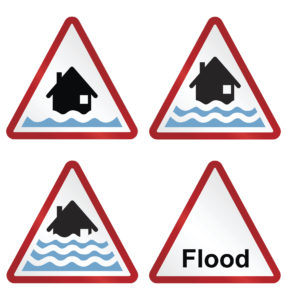One of the most dangerous and unpleasant disasters for any property owner is the backup of a sewer. Basement floods and water damage are bad enough, but if the water flowing in is coming from the sewage system, you’ll have a lot more to worry about than mopping the floor. If you’re wondering what causes sewer backups in your basement, and how to stop or fix a sewer backup, here’s what you need to know.
What Is a Sewer Backup?
What is the meaning of a sewer backup? Most people recognize that floods can cause extensive water damage to homes and buildings, but did you know that they can also bring sewage from sanitary sewer lines into homes through drain pipes? The damage caused by these backups are difficult and expensive to repair and can pose serious health hazards to your family. If you experience a sewer backup in your basement, you will need to be aware of the sewage backup health risks, and get the situation remedied immediately.
iStock.com/Baz777
How Dangerous Are Sewage Backups?
Sewage backups are one of the worst plumbing issues because of the high health risks for residents. Sewage is full of harmful bacteria, contaminants, and viruses, and can spread illnesses, disease, and lead to death in some cases. It may even contain other toxic substances like residuals from pharmaceutical drugs, pesticides, fungi, and protozoan. Here are some of the most common bacteria found in sewage, and how they can harm the human body:
- E. Coli: Symptoms include abdominal cramping, diarrhea, and occasionally death
- Acanthamoeba: Eye, nose, throat and ear infections.
- Salmonella: Abdominal cramping and diarrhea
- Helicobacter Pylori: Increased chance of ulcers
- Hepatitis: Liver infection and liver failure
- Leptospirosis: Muscle aches and vomiting
If you or your residents come into contact with any of these contaminants, you must immediately go to the emergency room. Sewage backup in your home is a serious risk, and a professional water damage restoration company should be called right away.
Most Common Causes of Sewage Backup
Tree Roots
As pretty as trees look around your home, they seek moisture, which can make its way into sewer line cracks to cause damage. As the tree or shrub grows, the roots grow deeper and stronger, and if they enter the service pipe at joints, a blockage can occur. If you suspect a city or private tree is putting your sewer line at risk, contact the city or property owner.
Broken Sewer Lines
Older sewer lines are typically made from cast iron and clay, and these materials break down with time, crack, or warp. If this should occur, sewage can backup through your drains to cause a mess. Replacing old home lines with plastic ones is the best way to make sure future issues do not happen.
Sewer Backup Caused by Clogs
Sometimes sewer backups are caused by simple clogs or backups in the home’s pipes. This cause is easily preventable by routinely inspecting and maintaining your pipes. You should also avoid pouring grease down the drain, which will solidify in the pipes to create blockages. To prevent a clogged sewer line in your basement, do not flush items that say “non-flushable.” These can all create backups within your pipes. Flushable items can also cause clogs, such as too much toilet paper, hair, or soap scum clogging the drain.
Full Septic Tank
If you have a septic tank, make sure it is regularly pumped. If it is not maintained regularly, it can get full and prevent sewage from flowing through the system. When this happens, the sewage backs up and seeps in through your drains.
Spring Flooding
For every public sewer there is a limited capacity. During the spring when there is more frequent heavy rainfall, sewer lines are more at risk. If the rainfall goes above the capacity of the sewer, the excess can flow into your sewer line, preventing it from working properly.
Grease
Although hot grease is liquid when you pour it down the drain, it quickly cools in the pipes and can begin to thicken. When grease hardens and builds up over time, it will catch debris that flows down the same pipes. This can lead to a sewer backup. Find other ways to dispose of grease, such as freezing it in a disposable container and throwing it in the garbage.
Sewage Backup Cleaning in Toronto, ON
Drain and sewer backups can cause serious damage to your home and personal property and can cause health risks to you and your residents. The bacteria and viruses in sewer water is extremely harmful, and can spread infection, illness, disease, and even cause death in some cases. Seeking immediate sewage backup cleanup can prevent this, so if your basement becomes flooded by sewage water, contact the professionals immediately.
If you require immediate sewage backup cleaning services in the Greater Toronto Area, Flood Services Canada can help you. It may be possible to handle a situation such as an overflown toilet on your own, but serious forms of sewage backup such as a flooded basement require professional remediation. Our 24/7 service teams are ready to provide you with quick-response action to minimize damage. We provide thorough structural drying, decontamination, deodorization, and debris removal to get your home back to a safe and functional environment. Contact us at (416) 302-2107 to learn more about how to protect your property, or if you are experiencing an emergency, call our hotline at (416) 999-3930.

